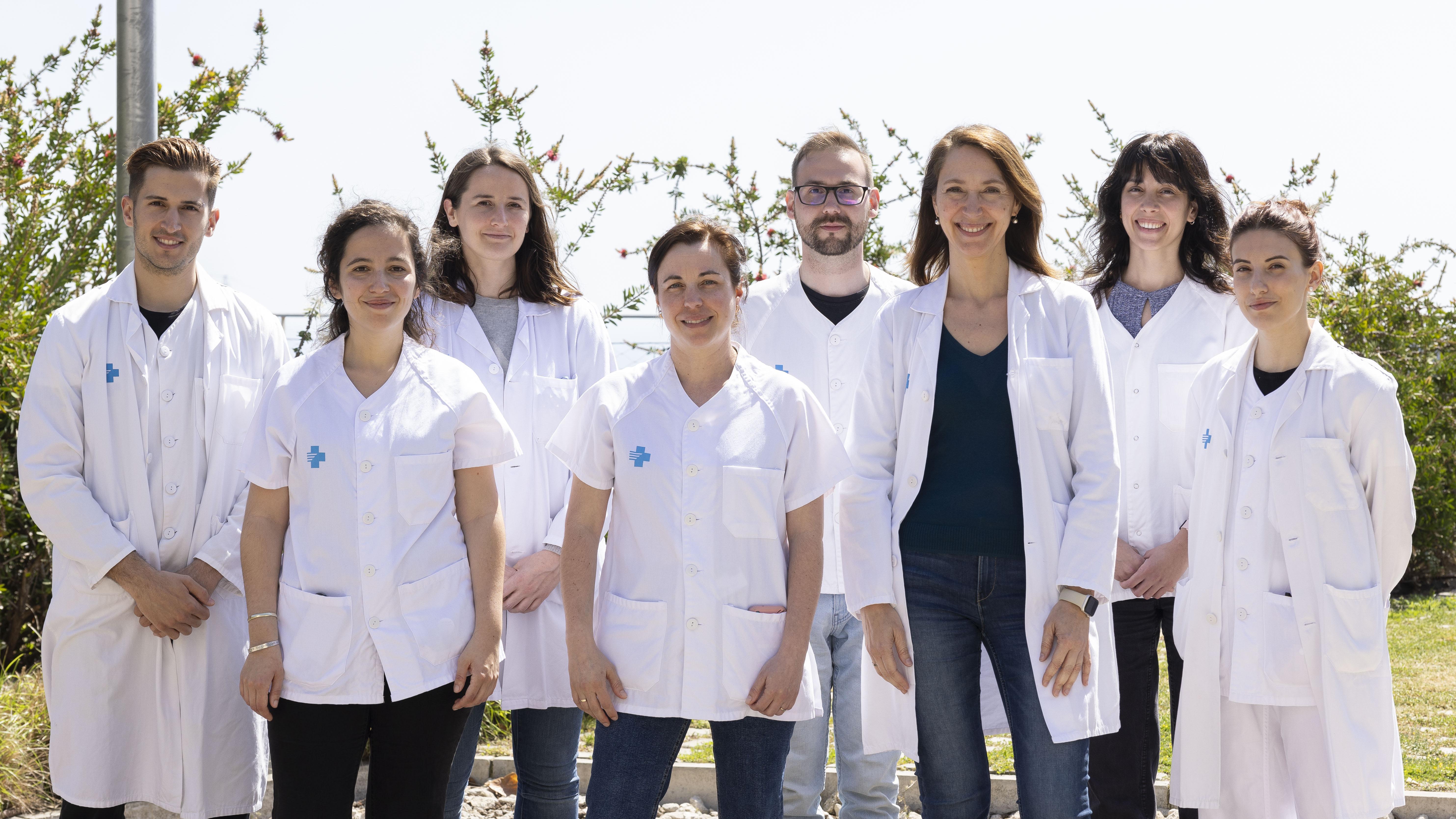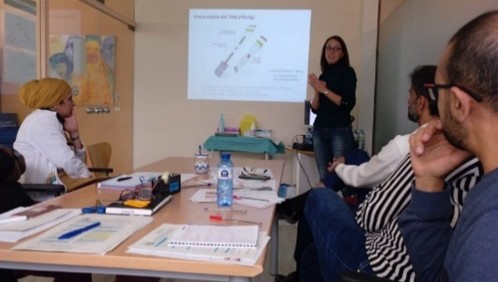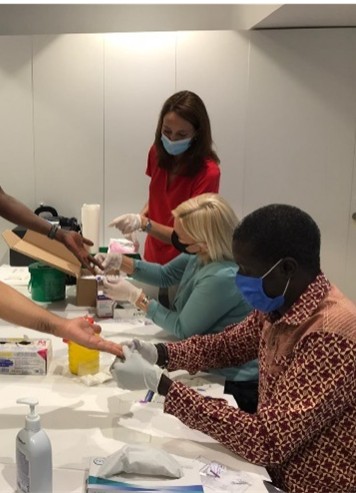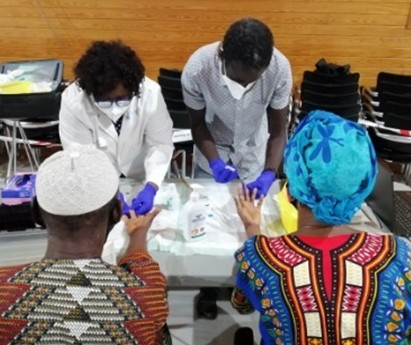About
The Pathogen Diagnostics and Genomic Epidemiology Research Group (DxEpiPath), formerly known as Clinical Virology and New Diagnostic Tools Group, was created in 2010 and promotes multidisciplinary translational research to improve the prevention, diagnostics, and management of infections caused by viruses and other pathogens that have an impact on clinical applications and public health. Through new diagnostic tools and models of care, the group is contributing to the elimination of viral hepatitis in vulnerable populations. The team is also applying different genomic sequencing strategies to characterize the epidemiology and contribute to the control of highly transmissible pathogens, often involved in outbreaks; the group specialises in genomic epidemiology and surveillance of SARS-CoV-2, tuberculosis, Monkeypox virus and drug resistant bacteria. Regarding tuberculosis, Elisa Martró led a multicenter, population-based genomic epidemiology study of Mycobacterium tuberculosis complex strains in Catalonia (TB-SEQ) that resulted in the implementation of this new strategy into formal tuberculosis prevention and control activities, in which the full group is involved.
The group is located at the Microbiology Service, Clinical Laboratory North Metropolitan Area (LCMN) of Germans Trias i Pujol University Hospital and is part of the Clinical Microbiology and Experimental Infectious Pathology Group, a consolidated research group funded by the Catalan Government (2021 SGR 00931). Since May 2025, Elisa Martró also leads Group 27 of the Centro de Investigación Biomédica en Red de Epidemiología y Salud Pública (CIBERESP), integrated by DxEpiPath and CEEISCAT membres (formerly led by Jordi Casabona).
Keywords: molecular diagnostics, genomic surveillance, genomic epidemiology, outbreaks, viral hepatitis, SARS-CoV-2, tuberculosis, antimicrobial resistance (AMR).

Group leader
- Elisa Martró, PhD

Elisa Martró, PhD
Elisa Martró, PhD in Biology and Senior Researcher, completed her Master's degree in Clinical Microbiology at the Microbiology Service of the Germans Trias i Pujol University Hospital (HUGTiP), within the Germans Trias i Pujol Research Institute (IGTP), focusing on tuberculosis during the period 1999-2000. At the same time, she developed an interest in research on viral infections, which led her to carry out the experimental part of her PhD from 2001 to 2003 as a Guest Researcher at the Centers for Disease Control and Prevention (CDC) in Atlanta, USA, focusing on human herpesviruses (HHV-8 and Epstein-Barr virus). Upon her return, she spent one year at the Centre for Epidemiological Studies on HIV/STIs of Catalonia (CEEISCAT), working on Kaposi's sarcoma (HHV-8) and HIV. She defended her doctoral thesis in 2005, for which she received two awards from the Universitat Autònoma de Barcelona and the Royal Academy of Doctors of Spain.
Back at the Microbiology Service at HUGTiP, Dr Martró initiated a research line on hepatitis C virus (HCV) in 2006 as a postdoctoral researcher and, since 2010, has served as Principal Investigator of the Clinical Virology and New Diagnostic Tools research group, within the Miguel Servet competitive program for researchers in the National Health System (Instituto de Salud Carlos III). Her group's research on HCV has focused on the study of the genetic variability of the virus and its applications in both clinical and molecular epidemiology, as well as on improving diagnosis in vulnerable populations through new molecular assays and screening strategies. Her work on characterising the local HCV epidemic led her to join, in 2018, the Commission for the development and monitoring of the "Plan for the prevention and control of hepatitis C in Catalonia" of the Public Health Agency of Catalonia (ASPCAT), and to contribute to national and international guidelines and best-practice compilations.
Since 2020, the focus of her research has expanded to the molecular diagnosis and genomic epidemiology of various viruses and bacteria of clinical and public health relevance. As a result, she renamed her research group within IGTP as Pathogen Diagnosis and Genomic Epidemiology (DxEpiPath) and was promoted to Senior Researcher (R4) in 2024. Dr Martró co-led the TB-SEQ pilot study on population-based genomic epidemiology of tuberculosis in Catalonia (CIBERESP intramural call, 2022), which contributed to the implementation of this strategy by ASPCAT in 2022. Many of the new techniques developed within her research projects have been incorporated into the routine activity of the Microbiology Service. She therefore co-directs, together with Verónica Saludes, the Sequencing Area, which is accredited under the UNE-EN ISO 9001:2015 standard. Dr Martró is a member of the Clinical Microbiology and Experimental Infectious Pathology Group at IGTP, led by Dr P. J. Cardona, Head of the Microbiology Service at HUGTiP.
In April 2025, she was appointed PI of Group 27 of the CIBER in Epidemiology and Public Health (CIBERESP), Instituto de Salud Carlos III.
Contact: emartro(ELIMINAR)@igtp.cat
ORCID: 0000-0002-2867-6649
Team
Researcher, co-head of the Sequencing Area
Verónica Saludes, PhD(ELIMINAR)
Researchers, Bioinformaticians
Antoni E. Bordoy, PhD(ELIMINAR)
Poppy J. Hesketh-Best, PhD(ELIMINAR)
Researchers
Alexia París, MSc(ELIMINAR)
Maria Piñana, PhD(ELIMINAR)
PhD student
David Panisello, MSc(ELIMINAR)
Laboratory technicians
Sara González(ELIMINAR)
Aniol Català(ELIMINAR)
Research lines
Viral hepatitis
Viral hepatitis is a global public health challenge, comparable to other major communicable diseases, including HIV, tuberculosis and malaria. In 2016, the WHO launched the first Global Health Sector Strategy on Viral Hepatitis with the aim of eliminating viral hepatitis as a major public health threat by 2030. In order to achieve this ambitious goal, a rapid and massive scale-up of diagnosis and treatment is required.
Hepatitis C
Hepatitis C virus (HCV) chronic infection is characterised by a slow and silent progression, and it is the leading cause of liver-related morbidity and mortality worldwide due to HCV-related complications, which include: cirrhosis, hepatocellular carcinoma and liver failure. With the advent of highly-effective new antiviral drugs, HCV infection can be currently cured by antiviral treatment in most patients. However, many infected people are unaware of their infection and, therefore, are not eligible for treatment. This is especially relevant among vulnerable populations, such as people who inject drugs or migrants from endemic countries.
The group's research activity has focused on the molecular study of HCV and involves aspects of basic oriented, clinical and public health research, which have been developed through overlapping competitive research projects and collaboration agreements with the industry. The group is working towards the elimination of HCV infection in collaboration with the Public Health Agency of Catalonia (within the Plan for the Prevention and Control of Hepatitis C in Catalonia), CEEISCAT and other groups through two main strategies:
- Improvement of the diagnosis of active HCV infection and linkage to care.
- Design and implementation of new diagnostic assays and screening strategies in community and healthcare settings.
- Promoting the micro-elimination of HCV in vulnerable populations through new models of care including education, prevention, screening, and linkage to care and treatment, and combating reinfection.
- Characterisation of the molecular epidemiology of HCV: assessment of epidemiological markers (prevalence, incidence, acute infection) and transmission dynamics in key populations by next generation sequencing and phylogenetic analysis to understand how the virus spreads and contribute to its control.
Hepatitis B
Regarding hepatitis B virus (HBV), the group has been working on two main activities in vulnerable populations:
- Design and implementation of new strategies for education, screening, and linkage to care and treatment.
- Assessment of HBV vaccination needs and targeted vaccination strategies.
The team is also working to expand screening of vulnerable populations not only for viral hepatitis, but also for other infectious diseases such as sexually transmitted infections (STI) and tuberculosis, in an integrated and people-centered way.
Molecular diagnostics and genomic epidemiology of other infectious diseases
Over the last five years, this research group has been applying its knowledge in next-generation sequencing and phylogenetic analysis - previously acquired in the field of HCV - to other pathogens with clinical and public health interest. By sequencing the genome of pathogen samples from patients, we can study the origin of outbreaks, how they spread and evolve, and which strategies may contain them. In this way, genomics can guide decisions of infection control teams and public health authorities about how to target their efforts to control transmission. Additionally, whole genome sequencing has become the reference method for typing and studying antimicrobial resistance for a growing number of pathogens. Pathogen genomics is increasingly being used for a new generation of diagnostics and therapeutics.
Severe acute respiratory syndrome coronavirus 2 (SARS-CoV-2)
Following the first pandemic wave of coronavirus disease 2019 (COVID-19), the emergence of SARS-CoV-2 variants has led to waves of infections across the globe. With the COVID-19 pandemic, genomic surveillance has been implemented at scale worldwide for the first time, with an unprecedented rate of genome data generation, greater than for any other pathogen.
- Genomic surveillance of circulating variants, for the early detection of mutations, monitoring of virus evolution and evaluating how variants might hamper detection by diagnostic tests, as well as influence effectiveness of vaccines and antivirals, to ultimately inform public health interventions.
- Molecular epidemiology studies of outbreaks in hospitals, long-term care facilities and other closed settings, in order to characterise virus spread and translate genomic information into meaningful clinical reports for infection control teams in order to improve outbreak control.
The group is also working to expand this line of research to other respiratory viruses, such as influenza virus and respiratory syncytial virus (RSV).
Tuberculosis (TB)
Worldwide,TB has probably returned to being the world's leading cause of death from a single infectious agent (replacing COVID-19, and above HIV/AIDS). Multidrug-resistant TB (MDR-TB) remains a public health concern and a health security threat. Ending the TB epidemic by 2030 is among the health targets of the United Nations Sustainable Development Goals. Despite significant progress in the control of Mycobacterium tuberculosis complex (MTBC) transmission, traditional contact-tracing strategies have limitations that can be overcome using whole genome sequencing (WGS) data as a high-resolution epidemiological marker.
The group led a pioneering prospective, population-based, multicentre study of genomic epidemiology of the MTBC strains circulating in Catalonia (TB-SEQ), co-led by Iñaki Comas (IBV-CSIC), in direct collaboration with Pere-Joan Cardona (CIBERES) and a network of public and private laboratories, which was subsequently implemented whithin the formal Tuberculosis Prevention and control activities by the Public Health Agency of Catalonia (Health Department, Generalitat de Catalunya) since 2022, with the following main aims:
- Characterisation by genomic epidemiology of how TB is being transmitted in Catalonia and its determinants, in order to improve the control of this infection. Group members belong to the multidisciplinary "Expert Group in WGS Applied to Public Health", which periodically discusses genomic and epidemiology characteristics of ongoing outbreaks.
- To evaluate the use of WGS as the new reference methodology for the detection of resistance markers in the clinical microbiology laboratory.
In 2024, a new project has been funded (PI23/00528) to develop and pilot a new decentralised tuberculosis screening strategy, integrated into viral hepatitis and HIV/STI screening programs in vulnerable populations. Over the TB-SEQ project, evidence has shown the involvement of vulnerable populations (including people who use drugs, homeless people, and migrants from countries with a high tuberculosis incidence) in clusters of recent transmission. Based on these findings, this project aims to fight transmission hotspots, by improving the screening of active tuberculosis in most affected populations and integrate the screening of all infections affecting these vulnerable populations at once.
Antimicrobial resistant bacteria
- Molecular epidemiology of outbreaks and circulating strains of multidrug-resistant bacteria, including carbapenemase or extended-spectrum beta-lactamase (ESBL) producing Klebsiella pneumoniae and/or, vancomycin-resistant Enteroccocus faecium, or methicillin-resistant Staphylococcus aureus, among others.
- Validation of molecular assays for the diagnosis of bacterial infections and resistance genes in collaboration with industry. The group has especially worked in the molecular diagnostics of sepsis, a time-dependent syndrome that represents the main cause of death by infection worldwide, therefore shortening the time to microbiological diagnosis saves lives.
Sexually Transmitted Infections (STI)
The prevalence of STIs is currently increasing worldwide. This research group has optimised various diagnostic techniques adapted for minimally-invasive sampling (especially urine, saliva, and fingerpick blood) for the screening of STI in vulnerable populations attending alternative testing centers, contributing to their epidemiological characterization with public health applications. It has also performed molecular diagnostics and epidemiology studies of human Papillomavirus (HPV) and Monkeypox virus.
16S rRNA sequencing applications
A nanopore-based 16S rRNA sequencing assay has been validated from direct clinical samples for the molecular microbiological diagnosis of complex infections that need an urgent diagnosis and conventional diagnostics methods show limitations.
The same sequencing assay is being used to characterise the bacterial microbiota associated to specific diseases. The field of microbiota research is rapidly expanding, driven by its potential to revolutionise our understanding of health and disease. The group collaborates in several projects with different HUGTiP clinical services, including the Microbiology Service (project PI24/01595, PI: Pere-Joan Cardona, focused on intestinal bacterial microbiota and invasive enterococcal disease).
Active projects
Estimation of the incidence and characterization of the profile of hepatitis C virus acute infections among people who inject drugs accessing harm reduction centers: how far is Catalonia from elimination goals?
PI: Elisa Martró
Funding agency: Gilead Sciences, S.L. - 7ª Convocatoria de Becas Gilead a proyectos de Microeliminación en Hepatitis C y de Diagnóstico y Vinculación al SNS de pacientes con Hepatitis D, evaluated by AEEH
Duration: 01/01/2025 - 31/12/2025
Brand-specific COVID-19 vaccine effectiveness against severe COVID-19 disease in Europe (COVIDRIVE)
PI: International consortium coordinated by FISABIO; PI at IGTP: Irma Casas
Funding agency: P-95 CVBA Development Aid
Agency code: COVIDRIVE
Duration: 24/05/2021 - 31/01/2025
More information
New decentralized screening strategy of tuberculosis, integrated into viral hepatitis and HIV/STI screening programs in vulnerable populations (IntegraTB)
PI: Elisa Martró
Funding agency: Instituto de Salud Carlos III (ISCIII)
Agency code: PI23/00528
Duration: 01/01/2024 - 31/12/2026
Brand-specific COVID-19 vaccine effectiveness against severe COVID-19 disease in Europe - A contribution of id.DRIVE, a public-private partnership to estimate brand-specific COVID-19 vaccine effectiveness in Europe (id.Drive)
PI: Coordinated by P95 and FISABIO. Site PIs at IGTP: I. Casas/E. Martró
Funding agency: Public-Private Partnership (P-95 CVBA Development Aid)
Duration: 01/02/2025 - 31/08/2025
More information
Consolidation of WGS and RT-PCR activities for SARS-CoV-2 in Spain towards sustainable use and integration of enhanced infrastructure and processes in the RELECOV network (RELECOV 2.0)
PI: Inmaculada Casas (ISCIII); PI at IGTP: Pere-Joan Cardona
Degree of contribution: Steering Committee
Funding agency: Horizon Europe: EU4H Project Grants
Agency code: EU4H-2022-DGA-MS-IBA-01-02
Duration: 01/07/2023 – 31/03/2026
More information
Centre de suport del Programa de Vigilància de la Tuberculosi a Catalunya
PI: Pere-Joan Cardona
Funding agency: Departament de Salut, Generalitat de Catalunya
Agency code: GC106/2022
Duration: 2022 – to date
Past projects
Population-based genomic epidemiology study for tailored strategies for surveillance and control of tuberculosis (TB-SEQ)
PI: Elisa Martró. Co-PI: Iñaki Comas
Funding agency: CIBER en Epidemiología y Salud Pública (CIBERESP), Instituto de Salud Carlos III (ISCII)
Agency code: ESP22PI06
Duration: 01/01/2022 - 31/12/2023
Video
Genomic epidemiology of SARS-CoV-2 in Catalonia: virologic surveillance and outbreak control
PI: Marc Noguera (IrsiCaixa). Co-PI: Elisa Martró (IGTP, CIBERESP)
Funding agency: Fundació Marató de TV3
Agency code: 342/C/2021
Duration: 23/09/2021 - 22/09/2023
Pilot hepatitis C simplified screening and linkage to treatment strategy in community pharmacies (HepTestFarma)
PI: Elisa Martró
Funding agency: Becas Gilead a Proyectos de Microeliminación en Hepatitis C (5ª Convocatoria, 2022)
Agency code: GIL181
Duration: 01/01/2023 - 31/12/2024
Cost-effectiveness of a community intervention versus a healthcare-based strategy for promoting the prevention, diagnosis and treatment of hepatitis B and C in immigrants in Catalonia (HepBClink)
PI: Elisa Martró
Funding agency: Instituto de Salud Carlos III (ISCIII)
Agency code: PI19/0568
Duration: 01/01/2020 - 31/12/2024
Epidemiological modelling of SARS-CoV2 in a post-pandemic surveillance context: an open platform for mid-term scenarios and short-term predictions
PI: Clara Prats Soler
Funding agency: Fundación BBVA
Duration: 01/07/2022 - 30/06/2024
Grup de Microbiologia Clínica i Patologia Infecciosa Experimental. Ajuts de suport als grups de recerca consolidats de Catalunya
PI: Pere-Joan Cardona
Funding agency: Agència de Gestió d'Ajuts Universitaris i de Recerca (AGAUR)
Agency code: 2021 SGR 00931
Duration: 2022 - 2024
Enhancing Whole Genome Sequencing (WGS) and/or Reverse Transcription Polymerase Chain Reaction (RT-PCR) national infrastructures and capacities to respond to the COVID-19 pandemic in the EU and EEA
PI: Cristobal Belda Iniesta (ISCIII) ; PI at IGTP: Ignacio Blanco, Pere-Joan Cardona
Funding agency: European Centre for Disease Prevention and Control (ECDC)
Agency code: ECDC.HERA.2021.024
Duration: 03/09/2021 - 30/09/2022
Development of Robust and Innovative Vaccine Effectiveness (IMI-DRIVE_3)
PI: International consortium coordinated by FISABIO. PI at IGTP: Guillermo Mena, Irma Casas
Funding agency: Innovative Medicines Initiative
Duration: 15/09/2021 - 30/06/2022
Defining the best strategy for global HCV screening, linkage-to-care, education and prevention in PWID population
PI: Sabela Lens
Funding agency: Gilead Sciences, Inc (Foster City CA, EEUU) (HCV CHIME program: Conquering Hepatitis vIa Micro-Elimination)
Duration: 01/10/2018 - 30/09/2024
Screening of bloodborne viruses in the emergency department of Hospital Germans Trias i Pujol (FOCUS)
PI: RM. Morillas, E. Martró, A. Carreras, E. Negredo
Funding agency: Gilead Sciences, S.L.
Duration: 27/06/22 - 30/11/2023
Screening of bloodborne viruses in the emergency department of Hospital Germans Trias i Pujol
PI: Rosa Mª Morillas, Elisa Martró, Anna Carreres, Eugènia Negredo
Funding agency: Gilead Sciences, S.L.U.
Agency code: FOCUS Program
Duration: 27/06/2022 - 26/09/2024
Screening of bloodborne viruses in the emergency department of Hospital Germans Trias i Pujol (FOCUS)
PI: RM. Morillas, E. Martró, A. Carreras, E. Negredo
Funding agency: Gilead Sciences, S.L.
Duration: 01/02/2025 - 31/01/2025
Scientific publications
Highlighted publications
Bordoy AE, Vallès X, Fernández-Náger J, Sánchez-Roig M, Fernández-Recio J, Saludes V, Noguera-Julian M, Blanco I, Martró E; Quatre Camins COVID-19 Study Group. Analysis of a large SARS-CoV-2 (Alpha) outbreak in a Catalan prison using conventional and genomic epidemiology. J Infect Dis. 2024 Apr 4:jiae161. DOI: 1093/infdis/jiae161.
Antuori A, Not A, Mesías-Gazmuri J, González V, Montoro-Fernandez M, Folch C, Saludes V, Villar M, Meroño M, Paytubi S, Alemany L, Casabona J, Martró E; SexCohort Group. High Hepatitis B Prevalence and Vaccination Needs Among Transgender Women and Men Sex Workers in Barcelona, Spain. Open Forum Infect Dis. 2024 Jul 17;11(8):ofae410. DOI: 10.1093/ofid/ofae410.
Not A, Saludes V, Gálvez M, Miralpeix A, Bordoy AE, González N, González-Gómez S, Muntané L, Reyes-Urueña J, Majó X, Colom J, Forns X, Lens S, Martró E. Usefulness of dried blood spot samples for monitoring hepatitis C treatment outcome and reinfection among people who inject drugs in a test-and-treat program. J Med Virol. 2023 Feb;95(2):e28544. DOI: 10.1002/jmv.28544.
Wang-Wang JH, Bordoy AE, Martró E, Quesada MD, Pérez-Vázquez M, Guerrero-Murillo M, Tiburcio A, Navarro M, Castellà L, Sopena N, Casas I, Saludes V, Giménez M, Cardona PJ. Evaluation of Fourier Transform Infrared Spectroscopy as a First-Line Typing Tool for the Identification of Extended-Spectrum β-Lactamase-Producing Klebsiella pneumoniae Outbreaks in the Hospital Setting. Front Microbiol. 2022 Jun 9;13:897161. DOI: 3389/fmicb.2022.897161.
Antuori A, Montoya V, Piñeyro D, Sumoy L, Joy J, Krajden M, González-Gómez S, Folch C, Casabona J, Matas L, Colom J, Saludes V, Martró E; HepCdetect II Study Group. Characterization of Acute HCV Infection and Transmission Networks in People Who Currently Inject Drugs in Catalonia: Usefulness of Dried Blood Spots. Hepatology. 2021 Aug;74(2):591-606. DOI: 1002/hep.31757.
Additional information
Collaborative networks
- CIBER in Epidemiology and Public Health (CIBERESP): E. Martró and V. Saludes, together with CEEISCAT (Centre d'Estudis Epidemiològics de les ITS/sida de Catalunya), belong to CIBERESP Group 27. The group has been led by Dr Jordi Casabona since 2007, and will be led by E. Martró when he retires. Within CIBERESP the Group participates in Program 2 "Epidemiology, prevention and control of communicable diseases" in collaboration with other groups interested in viral hepatitis, STIs and tuberculosis: Fernando González-Candelas (I2SysBio, València), Iñaki Comas (IBV-CSIC, València), Cristina Rius (Agència de Salut Pública de Barcelona), Pere Godoy (Sub-direcció General de Vigilància i Resposta a Emergències de Salut Pública-Agència de Salut Pública de Catalunya), Àngela Domínguez (Universitat de Barcelona), Laia Alemany (ICO), Juan-Carlos Galán (H. Ramón y Cajal, Madrid), Andrés Marco (Programa de Salud Penitenciaria, Institut Català de la Salut). The group also collaborates with researchers from other CIBER areas:
- CIBER in Hepatic Diseases (CIBEREHD): Rosa MªMorillas (Hospital Germans Trias i Pujol, Badalona), Sabela Lens and Xavier Forns (Hospital Clínic, Barcelona), Maria Buti (Hospital Vall d'Hebrón, Barcelona).
- CIBER in Respiratory Diseases (CIBERES): Pere-Joan Cardona (Hospital Germans Trias i Pujol, Badalona).
- CIBER in Infectious Diseases (CIBERINFEC): Julián González (Hospital Clínic - ISGlobal, Barcelona), MªTeresa Tórtola (Hospital Vall d'Hebrón, Barcelona), Núria Izquierdo and Marta Massanella (Fundació IrsiCaixa, Badalona).

- Viral Hepatitis Study Group (GEHEP). Sociedad Española de Microbiología y Enfermedades Infecciosas (SEIMC): E. Martró, V. Saludes and A. Not are members of GEHEP, and through this group they have participated in collaborative projects and publications with Antonio Aguilera (Hospital Clínico Universitario de Santiago de Compostela, A Coruña), Federico García (Hospital Universitario Clínico San Cecilio, Granada; CIBERINFEC), Gabriel Reina (Clínica Universidad de Navarra, Pamplona), Isabel Viciana (Hospital Virgen de la Victoria, Málaga) among others.
- National Laboratory Network for SARS-CoV-2 Genomic Sequencing (RELECOV). Since January 2021 a network of Spanish laboratories coordinated by the ISCIII (Inmaculada Casas, Centro Nacional de Microbiología, Instituto de Salud Carlos III, Madrid) in collaboration with the Ministry of Health represented by the Alerts and Emergencies Coordination Center (CCAES), was funded with two European grants (ECDC/HERA 2021 Grant/2021/PHF/23776 and EU4H-2022-DGA-MS-IBA-01-02), first to cover the sequencing needs and to gather knowledge of SARS-CoV-2 viruses through their genomic analysis, and then to integrate enhanced infrastructure and consolidate activities into routine surveillance of SARS-CoV-2 and outbreak investigation, in synergy with public health authorities of each CCAA with relevant on-going work at national and international level, to ultimately improve the preparedness measures for future health emergencies. E. Martró is part of the Steering Committee of the second project. More information

- COVIDRIVE: A public-private-partnership to monitor COVID-19 vaccination programs for public health institutes and brand-specific vaccine effectiveness for pharma companies. This network stems from the DRIVE network on influenza virus, and has expanded to include respiratory syncytial virus and other respiratory pathogens (Id.DRIVE). More information

- In the field of antimicrobial resistance, the group participates in RedLabRA (La Red de Laboratorios para la Vigilancia de Microorganismos Resistentes, Instituto de Salud Carlos III) and Conexión-AMR by CSIC, currently formed by 94 independent research groups. More information
Members of the group are also members of the following national and international scientific societies: Societat Catalana de Biologia (SCB), Sociedad Española de Microbiología y Enfermedades Infecciosas (SEIMC), Sociedad Española de Virología (SEV), Societat Española de Epidemiología (SEE), and European Society for Clinical Microbiology and Infectious Diseases (ECCMID).
Doctoral theses
Title: Micro-elimination of hepatitis B and C in vulnerable populations through new strategies for the promotion of education, screening and treatment
Author: Anna Not Gari
Director: Elisa Martró
University: Universitat Autònoma de Barcelona (UAB)
Date of defense: 18/10/2024
Title: Feasibility and acceptability of new models of hepatitis B care among African populations
Author: Camila Picchio (ISGlobal)
Directors: Jeffrey V. Lazarus, Elisa Martró
University: Universitat de Barcelona (UB)
Date of defense: 16/11/2023
Title: Improving the diagnosis and molecular characterization of viremic infection by the Hepatitis C virus in people who inject drugs
Author: Adrián Antuori (HUGTiP)
Directors: Elisa Martró, Verónica Saludes
University: Universitat Autònoma de Barcelona (UAB)
Date of defense: 03/2022
Innovation
In the field of hepatitis C, Dr Martró is a renowned researcher both nationally and internationally in the use of dried blood spot (DBS) samples and molecular point-of-care test for the first time in Spain, piloting new models of care based on decentralised diagnosis and simplified linkage to care and treatment. The group's research activity has led to several agreements with the diagnostics and pharmaceutics industry, and also to transference activities to public health, such as the contribution to the implementation of these new diagnostic solutions and testing strategies in the new protocol "Hepatitis C virus diagnosis and treatment protocol for people who use drugs" (Public Health Agency of Catalonia), and being cited as good examples within the "HCV infection screening guide" (Spanish Ministry of Health, 2020 and 2022 editions).
Additionally, the new diagnostic strategies and models of care have been included in several international compilations of best practices:
- "Hepatitis C: new models of care for drugs services" by European Monitoring Center for Drugs and Drug Addiction – EMCDDA- 2019
- "Case stories" by Cepheid 2022
- "Stories to Inspire" by ACHIEVE Coalition 2023, which was presented at an event on the elimination of hepatitis in the European Parliament. Download pdf
- "Barriers and solutions to increasing access to point-of-care HCV testing" (INHSU, 2023)
Finally, Dr Martró has also participated in clinical practice guidelines on hepatitis screening such as "Recommendations for the comprehensive diagnosis of chronic viral hepatitis in a single analytical extraction" published by several societies (AEEH, GEHEP, SEPD, SEIMC, AEHVE) and also in Crespo J, et al. Gastroenterol Hepatol 2023;46. Through agreements with the pharmaceutical industry (FOCUS Program, Gilead Sciences), Dr Martró has also co-led the implementation of improvements in the screening and linkage to treatment of patients with hepatitis C within Hospital Universitari Germans Trias i Pujol.
Dr Martró was invited to participate in the development of the web-based toolkit "Dried blood spot (DBS) testing for Hepatitis C" 2021 promoted by the International Network on Health and Hepatitis in Substance Users (INHSU). Additionally, Drs Martró and Saludes, with support from Abbvie, created a step-by-step pdf guide and a video with instructions for the collection of dried blood spot simples, which incorporates the experience in collecting these minimally invasive simples acquired through several projects since 2015, including the use of appropriate materials and quality controls, made publicly available in 2022.
Fostered by the group's research, in 2022 a population-based tuberculosis genomic surveillance (TB-SEQ strategy) was implemented in Catalonia as a part of the TB Control Program of the Catalan Government, resulting in a pioneer program in the country. Relevant transmission clusters, defined by public health authorities as those involving multidrug-resistant strains, rapidly growing, involving paediatric cases or with a wide geographical dispersion, are discussed by a multidisciplinary "Expert group in WGS applied to Public Health", which was consolidated in 2024 and involves Public Health agents and sequencing professionals. Transmission chains within relevant genomic clusters are dissected by median-joining network analysis, complemented with epidemiological metadata. This innovative way of shared work is helping to identify transmission causes and case relationships, enabling tailored control measures.
Outreach
The group has participated in several educational activities, some of which are available online:
- For the World Tuberculosis Day (24/03/2025), E. Martró and V. Saludes were invited to participate in a workshop organised by Hospital Universitari Mútua de Terrassa, giving a talk on the TB-SEQ genomic epidemiology strategy.
- E. Martró participated in "Els Dijous de Salut Pública" (27/02/2025), organised by Departament de Salut and open to all interested people, talking on "Improving equity in diagnosis of hepatitis C. The utility of current community screening techniques". More information
- E. Martró participated in the training webinar "Hepatitis C Virus in Special and Vulnerable Populations", a joint activity organized by ESCMID (ESGVH group) and SEIMC (GEHEP Group), available at SEIMC-Campus, talking about "Screening Strategies in Vulnerable Populations: When the Lab Goes Out of the Lab?" (25/11/2024). More information
- E. Martró participated in the XXVIII Jornadas Internacionales sobre Tuberculosis (12/11/2024) organized by Fundació uiTB, talking about "Challenges and advances in the TB genomic epidemiology strategy in Catalonia (TB-SEQ)". More information
- E. Martró participated in the thematic network "Divendres de recerca en addiccions a Catalunya", organised by Departament de Salut, talking about "New challenges in hepatitis C: micro-elimination in people who inject drugs" (11/10/2024). More information
- A.E. Bordoy was invited to participate in the XIV Jornadas de Enfermedades Emergentes organised by Fundació uiTB (11/06/2024), talking about "Brief history and current dynamics of SARS-CoV-2". More information
- V. Saludes was invited by the Col·legi de Biòlegs de Catalunya to give a webinar about the "Genomic epidemiology strategy for tuberculosis in Catalonia (TB-SEQ)" (17/04/2024). More information
- E. Martró was invited by the Viral Hepatitis prevention Board (VHPB) Technical Meeting on "Addressing Viral Hepatitis Among Europe's Migrant and Refugee Population: lessons learnt and the way forward", celebrated in Antwer (Belgium) in 26-27/03/2024, where she talked about "Point-of-care testing for hepatitis B and C in migrants in diverse community centres". The derived Meeting report is in the process of being published as an expert's opinion Peace at the Journal of Migration and Health.
- V. Saludes was invited by the Societat Catalana de Malalties Infeccioses i Microbiologia Clínica to give a talk on "Bacterial identification in infective endocarditis by nanopore sequencing of the 16S rRNA gene" (21/03/2024).
- E. Martró also participated in the Postgraduate Education Course "Diseases of poverty in the modern era" organised by the European Society of Clinical Microbiology and Infectious Diseases (ESCMID), with her lecture "Elimination of hepatitis B and C in people with substance use disorder: Is it possible?" (1-2/02/2024), available at the ESCMID Accademy.
- Several members of the group (Verónica Saludes, Alèxia Paris, Maria Piñana, Antoni E. Bordoy and D. Panisello) participate in the yearly program "Joves per la Medicina (Science Academy)" performing laboratory practices in genetics for high school students at hospitals, organised by Fundació Catalunya La Pedrera.
- E. Martró took part in the third episode of IGTP’s podcast Un bri de ciència on viral hepatitis, which was launched on World Hepatitis Day 2023.
Many of the group's projects are based on community involvement: when piloting new models of care for viral hepatitis in vulnerable populations, we have included community leaders and civil society associations, and performed educative sessions in diverse settings aiming to empower migrant populations (HepCdetect II, HepClink, HepBClink). Community health agents from endemic countries for HCV/HBV have been trained to be able to perform rapid testing and collection of dried blood spot (DBS) samples from their same migrant communities, in their own language. They have educated migrant communities on viral hepatitis with a tabled-based tool (Heparjoc) in collaboration with the "Equip de Salut Pública i Comunitària" (ESPIC, VHIR). They have evaluated patients' acceptability and satisfaction during the piloting of several new models of care. They have also collaborated with several NGOs (StopSida, Gays Positius, gTt-VIH, Àmbit) attending gender-diverse people, and trained community volunteers at these NGOs to perform rapid tests, DBS collection, and pre-/post-test counselling.
 |
 |
 |
News
Students from Badalona discover research at the Can Ruti Campus during Science Week
Nearly two hundred baccalaureate and vocational training students have taken part in a new edition of the activity "Open House: get to know the Can Ruti Campus up close", once again consolidating the campus's commitment to scientific outreach and to fostering vocations among young people.
A community-based action led by IGTP facilitates screening and access to treatment for viral hepatitis among migrant populations in Catalonia
On the occasion of World Hepatitis Day, IGTP presents the results of the HepBClink project, which has combined community educational actions on hepatitis B and C with screening and referral to treatment for migrants from Pakistan, Senegal and Romania. The project has involved the participation of the DxEpiPath group at IGTP and is part of the Tranversal Program CORE.
Contact
(+34) 93 497 88 94 extn 3447
More links
Elisa Martró on ResearchGate · Follow @ElisaMartro on X · Donate via Amics de Can Ruti
